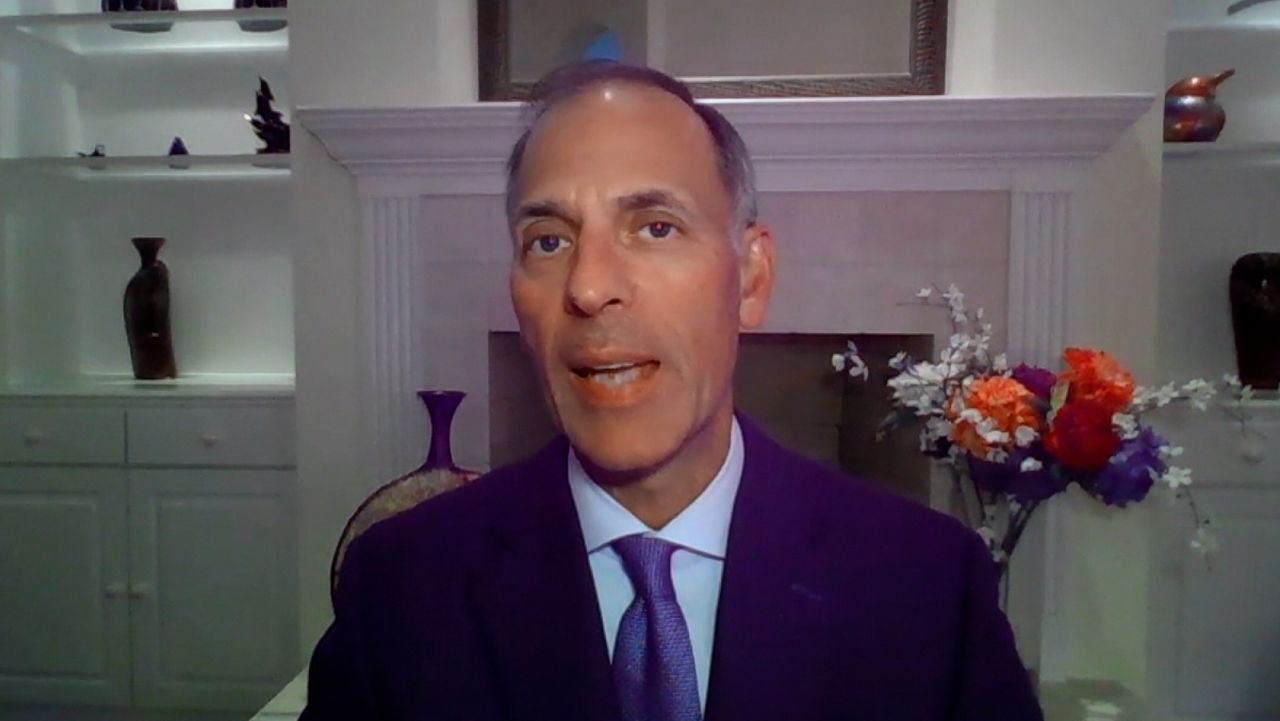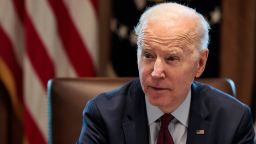America’s immediate political future will turn on this critical point: whether drivers stung by record gas prices blame Russian President Vladimir Putin or US President Joe Biden.
A staggering surge in the elevated cost of filling up since Russia invaded Ukraine represents another gut punch for consumers already swamped by a 40-year peak in inflation coming out of the pandemic.
And Biden acknowledged on Tuesday there is more pain to come, telling reporters his executive order banning imports of Russian energy signed Tuesday will heap more pain on gasoline prices ahead of spring break and summer vacation.
“They’re going to go up,” Biden said as he flew into America’s oil patch in Texas, where he was visiting veterans. “Can’t do much right now. Russia is responsible.” The President’s offhand remark is unlikely to soothe Democratic fears of a possible Republican rout in November’s midterm elections.
And it offered Republicans another opening. The GOP finds itself in the enviable political position of demanding that Biden suffocate Russian energy exports, here and in Europe, while simultaneously hammering him for inevitable gas price hikes.
The war in Ukraine created yet another extreme challenge for Biden, who took office in the face of the worst public health crisis in 100 years and has seen his personal approval ratings plunge after failing to quickly conquer Covid-19 last year.
The gas price issue encapsulates a dilemma that can often afflict presidents at times of international crises. Biden is being compelled to take action in defense of critical global imperatives like the defense of international law, the plight of a people under vicious bombardment and a desire to deter a dangerous dictator. But he knows that his actions will have a detrimental impact back home. In the current polarized national environment and with only eight months to go before congressional elections, the downside for the President will only be magnified.
Biden tries to parry GOP attacks
Ukraine dominated Tuesday’s domestic political exchanges in Washington amid a classic Capitol Hill squabble about the best way to advance a $14 billion aid package for the war-battered country this week.
The critical political potential of the gas price debate as the midterm elections approach shone through the defensive messaging of Biden and other Democrats on the issue and a united front of attacks by Republicans.
The President delivered a fireside chat-style address earlier Tuesday as he took aim at Russian energy exports, taking Americans into his confidence with straight talk about the likely impact of his actions on their daily lives.
“The decision today is not without cost here at home. Putin’s war is already hurting American families at the gas pump,” Biden said, noting an increase of 75 cents per gallon for regular gasoline since the invasion started. He repeatedly laid the blame for “Putin’s price hike” on Russia, apparently seeking to insulate himself and other Democrats from the full force of Americans’ fury over rising prices.
But the President also appealed to something fundamental inside Americans – their reverence for freedom, empathy for the oppressed and a willingness to stand up to an autocratic Putin, even if they also have to pay a price.
“I said I would level with the American people from the beginning. And when I first spoke to this, I said defending freedom is going to cost, it’s going to cost us as well, in the United States,” Biden said at the White House.
There is early evidence that Americans will accept some personal difficulty in order to defend the freedoms of far-off Europeans and to confront tyranny, although though they are hardly being asked for the sacrifices demanded of previous generations during the war-scarred 20th century.
In a CNN/SSRS poll late last month, 83% of Americans said they favored increased economic sanctions against Russia after the invasion.
Biden tries to square climate policies with energy crunch
Yet with the conflict expected to grind on for weeks, if not months, and with Ukrainians showing no signs of giving up their resistance, the sanctions on Russia that have caused oil prices to balloon are unlikely to be lifted soon. That means months more duress for American drivers. High gas prices are especially punishing for working Americans living paycheck to paycheck or for those who have to drive long distances to work or school. Those costs may be amplified as Americans look to visit family or go on vacation with much of the country finally emerging from the pandemic.
So Biden also used his speech to deliver a warning to another unpopular target: oil and gas corporations.
“We understand Putin’s war against the people of Ukraine is causing prices to rise. We get that. That’s self-evident. But it’s no excuse to exercise excessive price increases or padding profits or any kind of effort to exploit this situation or American consumers,” Biden said. “Russia’s aggression is costing us all, and it’s no time for profiteering or price gouging.”
The President also sought to head off Republican arguments that he has contributed to the higher gasoline prices with his environmental policies after recommitting the United States to the Paris climate accord and making it harder for energy firms inside the country to produce oil and gas.
He argued that a long-term strategy to wean the country off fossil fuels and transition to renewables – a core goal of his presidency as he tackles global warming – also makes sense for American national security.
“If we do what we can, it will mean that no one has to worry about the price at the gas pump in the future,” Biden said. “That’ll mean tyrants like Putin won’t be able to use fossil fuels as weapons against other nations.”
Republicans launch unified attack
But Republicans, in a notable show of political discipline – albeit on an issue on which their leaders are exceedingly fluent after years of political campaigns – scythed through Biden’s strategy.
They largely ignored the global factors left over from the pandemic and the Russian invasion of Ukraine that are weighing on gasoline costs. And they accused Biden of leaving Americans vulnerable to energy shocks overseas by canceling the Keystone XL pipeline from Canada when he first took office. They claimed he doomed Americans to high gasoline prices by pausing oil and gas leases on public lands and by suspending oil leases in Arctic refuges to fight climate change.
Republican Sen. Roy Blunt of Missouri, for example, said Biden’s policies had directly produced a record gas price that hit $4.17 per gallon on Tuesday. Sen. Joni Ernst of Iowa rebuked the President for talking about the need to develop electric vehicles. Republican Rep. Bruce Westerman of Arkansas pointed to reports that the Biden administration had reached out to US foes like Venezuela and Iran and to estranged ally Saudi Arabia in an effort get more oil onto the market and ease prices.
“We don’t need to be buying Russian energy, but we sure don’t need to be buying Iranian energy or Venezuelan energy,” Westerman said. “We need to produce energy of all forms and all types here in the US.”
House Minority Whip Steve Scalise, a Louisiana Republican, delivered a sound bite that is likely to haunt vulnerable Democrats all the way to November, especially if oil prices continue to skyrocket.
“The challenge is that President Biden still won’t say yes to American energy, because to replace that Russian oil is the real critical step,” Scalise said.
Democrats in the House sought to limit the damage, arguing, for instance, that US oil firms had not taken up thousands of approved leases that are available for further exploitation.
“This could be taking supply off of the table,” said Rep. Pete Aguilar of California, the vice chair of the House Democratic caucus. “President Biden has led on this issue, approving leases more than his predecessor in the past.”
It’s also the case that some untapped US capacity is the result of long-term dips in oil prices before and during the pandemic, which made further exploration a poor economic proposition in some areas for oil firms. And the idea that the US can pump and use its own oil ignores the complexity of global markets and the reality of supply and demand, which can be influenced by major oil-producing nations.
Still, in politics, the most simple argument usually resonates. That’s why it’s a long shot that voters will give Biden a pass on high gas prices, even if they support punishing Putin now.





















